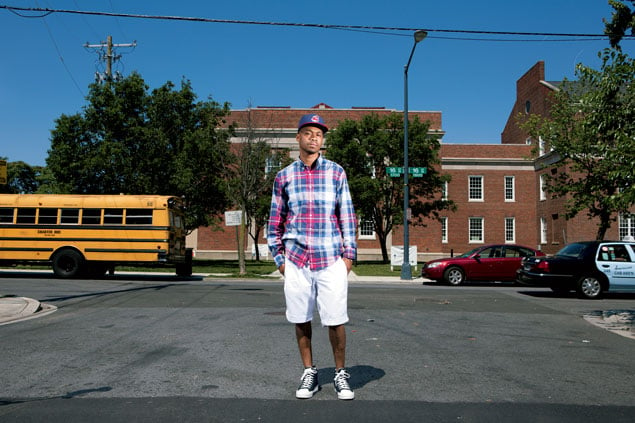On the morning of October 30, 2003, Devin Fowlkes couldn’t
decide what to wear. The high-school junior had a big day
ahead: the homecoming dance at noon, then a pep rally, where he’d be
introduced as starting tailback for the Anacostia High football team. He
put on jeans and a white T-shirt and went into his mother’s
room.
“Ma,” he said, “you like this?”
“Not really,” she told him.
He trusted his mom, Marita Michael, when it came to fashion.
She was the one who’d picked out his tuxedo for the prom and made sure the
color of his shirt matched his date’s dress.
“What about this?” he asked. He’d changed into a red-and-black
shirt that looked good with his new Air Jordans. Homecoming at Anacostia
was a casual affair.
That’s better, Marita said.
He took a shower, made himself an egg sandwich, and grabbed his
books.
“See you later,” his mom said. She knew he wouldn’t be home
till early evening, after football practice. “Love you.”
“Love you, too.”
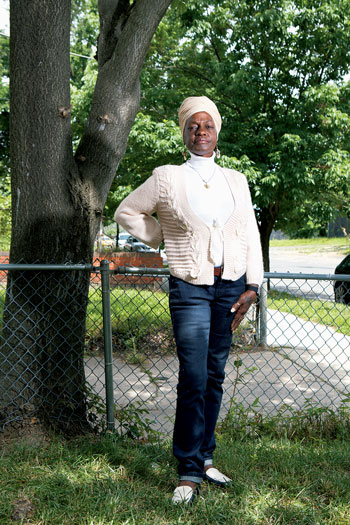
About two miles away, a baby-faced Anacostia ninth-grader named
Erik Postell slept late and got a ride to school from his older brother.
He’d spent the previous night, his 15th birthday, hanging around outside
with friends in Butler Gardens, an apartment complex in Southeast. Erik
liked being with older boys, doing things he wasn’t old enough to do. He
hustled dime bags of weed and drove his own ’88 Cadillac Fleetwood, even
though he didn’t have a license.
Erik’s days revolved around girls and clothes, and he had plans
to try out for the junior-varsity basketball team. But on the day of the
dance he had other things on his mind. A fistfight in the school cafeteria
a few weeks earlier had turned into something serious, so he’d bought a
gun and stashed it in the bushes near school.
Nine years later, what Erik remembers about that October day is
that he didn’t see Devin standing there in the parking lot when he started
shooting. All he saw were the guys who’d been hassling him. He was aiming
for them.
“I can visualize it. I remember everything I had on,” he says.
“But I can’t put together my thoughts, my whole thinking process at the
time.”
The “Devin situation,” as Erik calls it, had started weeks
earlier, over a girl. A friend of Erik’s had a girlfriend, and someone was
flirting with her.
“That dude’s fakin’,” Erik’s friend said.
When someone’s “fakin’,” that means he’s taunting you, messing
with you, trying to act tough. Erik barely knew this guy, but in high
school you take on your friends’ battles.
He and his buddy walked up a school stairwell and found the guy
who’d been flirting, waiting with his friends. The two groups beat up on
each other in the cafeteria, then scattered. The security guards and the
principal rounded them up and had a mediation, Erik says.
He thought it was over, but a week later he was riding in a
friend’s car when he saw one of the guys from the cafeteria fight running
behind the car waving a gun.
Erik says his own car was shot at a few days after that, blocks
from school. The back window shattered, and a bullet hit the trunk. He was
in it at the time but wasn’t hurt.
Erik talked to a security guard at school but never called the
police. He didn’t see the point. Even if he snitched, these guys had
friends, and their friends had friends.
“I weighed my options,” he says. “I could continue to go to
school and hope it might end, or I could deal with it
head-on.”
After the homecoming dance and pep rally, around 3 o’clock,
Erik says he and a friend were walking home and saw the white Cadillac of
one of the guys he’d been arguing with coming toward them; two guys were
in it. They pulled up beside him. Erik had the pistol in his bag. He was
sure these guys were after him again. They made eye contact, one guy
looked at him and laughed, and Erik thought he saw one of them reach for
his pocket. He took aim as the car was pulling away, missed, and ended up
firing into a parking lot filled with kids.
Two hours later, Devin Fowlkes, a nice kid he knew from art
class, was dead.
Devin was the tenth youth killed in the District in 2003 and
the 207th murder that year. Since then, another 130 juveniles have been
killed in DC, many at the hands of other teens.
Devin’s name went on a brown file folder at the Metropolitan
Police Department’s homicide branch in Southwest DC.
The case was solved quickly: At his mother’s urging, Erik
Postell turned himself in a day later and confessed. Because he was a
juvenile, his name was never released to the media.
Now 23, Erik has served his sentence and is trying to piece
together a life for himself. He’s hoping he can help keep his young
nephews out of the street life that sucked him in, a world where R.I.P.
shirts—with a dead person’s face on them—are in style.
Erik arrives for an interview on an early-spring evening
wearing dark-blue jeans, a sweater with buttons, and a crisp green Oakland
A’s baseball cap. He chooses his hats based on style, not teams. He’s
always nicely dressed for interviews, always articulate, always
introspective. If a killer has a look or a tone, it’s not
Erik’s.
He isn’t used to talking about Devin. He’s told a few of the
friends he’s met in recent years, but only if he thinks they’ll be in his
life awhile. It’s part of who he is, he says, and he can’t pretend it
isn’t. But it’s not like he robbed a house. He killed somebody—that’s not
something you go around sharing.
Erik doesn’t have flashbacks or see Devin in his dreams—perhaps
because he never saw Devin get hit, never saw him lying unconscious in the
school parking lot. He has looked at photos of Devin on Facebook and felt
something. Not guilt, exactly—more like regret. He wishes he had known how
to walk away from a bad situation. But in that place at that time, he did
what he felt he had to do to protect himself.
“I made a bad decision,” he says. “People from all walks of
life make bad decisions.”
Erik chose a long time ago to move forward, not backward. He’s
hoping he can do what Devin’s mother asked of him soon after the shooting:
“Get out of jail and change your life around for me,” she said. “Then my
son can live through you.”
T o make sense of what happened, Erik says, you have to
understand his life at the time. He was living with his mother, but she
was working and going to school. For him, that meant late nights outside.
No rules, nobody calling him in for dinner. He was running the streets at
age 14, so when he ran into trouble at school, a gun was the easy
answer.
Erik’s grandmother, Marva Green, had cared for him from the
time he was two because his mother, Michele, was an addict and his father
wasn’t around. Erik adored his mother.
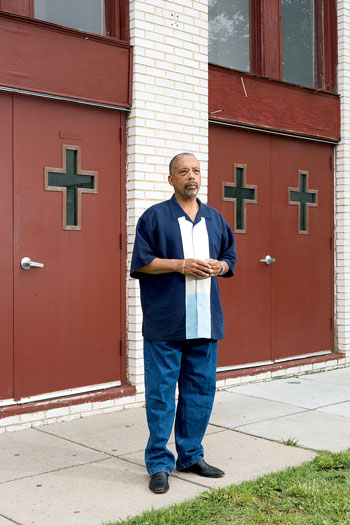
“Take me with you, Mommy,” he’d say when he saw her fixing her
hair to go out. Green didn’t want her daughter dragging Erik and his
brother, Daryl, into her self-destructive lifestyle, so she helped get
Michele into rehab and said she would take the boys. For a while,
everything was fine. Erik’s grandma filled his lunch box with homemade
fried chicken and cookies, and he talked about becoming a doctor when he
got older. In elementary school, he would come home, do his homework, and
run around with the neighborhood kids until dark. He had his own bedroom,
but in the morning Green often would find him curled up at the foot of her
bed.
When Erik was 11, he and a friend wrote their names in graffiti
on the exterior of their middle school. Erik’s grandmother couldn’t help
but laugh. “Why would he write his name?” she thought. Her
grandson started hanging around older boys she didn’t know and telling her
she was too strict. Michele was sober by then, so Green told Erik it was
time to go live with his mother.
His mom had an apartment on 25th Street, Southeast, a few
blocks from his grandmother’s house. She was working too much to keep tabs
on him. He’d always liked brand-name clothes, even as a little boy, and
the guys he knew who were dealing drugs seemed to have the best of
everything.
Erik made a good profit on the corner because he never smoked
what he sold. As a boy, he’d spent weekends with his mother at the Oxford
House—an addiction-recovery group home in a nice neighborhood in
Northwest—and sat with her in Narcotics Anonymous meetings, where he saw
men without teeth and heard people with AIDS talk about sharing
needles.
“People really don’t understand how much a kid can comprehend
at a young age—a five- or six-year-old can soak in so much from just
listening,” he says.
He made so much money dealing that he might go to bed at night
with $600 in his pockets. A few hundred for a gun was no big
deal.
B en Clark (not his real name), a community activist who does
youth-violence work in the District, has met lots of kids like Erik. Most
buy guns because they’re afraid, he says: “Eight times out of ten, when
you try to kill somebody, it’s because you fear that if you don’t kill
them, they’ll kill you.”
He once tried to shake hands with a middle-schooler he passed
on the street, and the boy wouldn’t take his hands out of his sweatshirt
pocket because he was trying to conceal a machine gun.
“What the hell are you doing?” Clark asked him.
“Man, they coming through my neighborhood,” the boy said. “I’m
gonna do that to them.”
Do that meant kill them.
“No, you’re not,” Clark said. “Give me some time to talk to
you.”
Two decades ago, when Clark was growing up in DC, he says, you
could look at certain guys and know they were dangerous. The thugs stood
out. Now everybody blends together and you never know who might be
carrying a weapon.
“Years ago, there were rules to this,” Clark says. “Somebody’s
with their mother, you wouldn’t shoot them. If somebody’s in their house,
you wouldn’t go shoot up the house. Nowadays, they don’t care about the
rules. The rules are ‘I live—you die.’ ”
People call Clark, who has served time for attempted murder,
when something bad is about to happen. His job at the nonprofit he works
for is to step in and try to quash beefs before they become violent. It’s
not the type of work you want to bring attention to, Clark says. If your
name is out there, the kids will stop trusting you: “You’re not supposed
to hear about the truces.”
He’s especially busy after a shooting, when there’s word on the
streets that someone is going to retaliate. Many fights start at school
and spill over into the community. The key, Clark says, is to get to the
kids before they get to each other.
“Somehow, God has blessed me to be able to de-escalate. I can
talk to kids and they’ll listen,” he says. “I’ve been in instances where I
didn’t even know a guy, and I ran and pushed another kid out of the way so
he didn’t get shot, and the guy pointed his gun at me. The other kids were
like, ‘Nah, that’s Ben,’ and he put the gun down.”
He recently got involved with a feud between a neighborhood
crew and a group of high-school football players.
“Someone called me and said, ‘Man, we need you to come over and
deal with this before it gets into gunplay,’ ” Clark says. “We negotiated,
and I had to settle for someone getting beat up.”
A colleague of Clark’s once received a call from a member of
DC’s Trinidad crew. “The E Street dudes are in our neighborhood right
now,” the guy said. “We’re about to do that.”
“No, no—hold on!” he said. He made a couple of calls and found
out the E Street guys were in Trinidad checking out girls—they weren’t
looking for trouble. Nobody got hurt. “A lot of times we’re able to stop
these things,” Clark says. “Sometimes we find out too late.”
When Erik fired his pistol, Devin Fowlkes and his teammates
were hanging around in the parking lot, waiting for football
practice.
Willie Stewart, who had coached the Anacostia High Indians for
more than two decades, was finishing some work in his keyboarding
classroom when he heard two loud pops. He thought someone was messing
around with firecrackers. Then one of his players banged on his classroom
door.
“Devin got shot!” the boy said.
Stewart ran outside and saw Devin lying on his back, eyes
closed, bleeding through the football jersey he’d worn to the pep
rally.
“Who’s riding with him?” a paramedic asked.
A father of three sons, Stewart got into the ambulance and
prayed. He’d already lost other players to gun violence: Anthony Butler,
Rodney Smith, Lashon Preston, Donald Campbell. Preston was killed on his
front steps the night before a game; Campbell was hit twice over a small
bag of marijuana.
You don’t have to settle your problems with guns, he
would tell his team. A gun is so final.
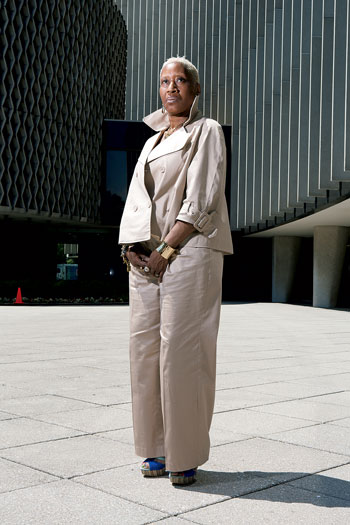
Stewart’s players had told him how easy it was to get a gun—a
“burner,” they called it. You could rent, buy, or borrow one. It’s not
that it was cool to carry one, they said; sometimes you just had to. When
someone disrespected you—on the basketball court, in the hallway at
school—you had to straighten it.
“What are you gonna do about that?” he would hear students say.
“You gonna take that?”
Devin, a junior, wasn’t one of the players Stewart worried
about. He had a B average. His mother, Marita, came to all of his football
games and rang a cowbell in the bleachers. After practice, he would go
home and play video games with friends. He’d call Marita at the Verizon
Center, where she was a cook, ask her to bring him a half-smoke or a
hoagie, then meet her at the bus stop to walk her home. He was a good kid,
polite, the kind who helped elderly neighbors take in their
groceries.
But in Anacostia, good kids still caught bullets in the chest.
“You need to work your butt off, get a scholarship, and get out of here,”
Stewart would tell his players. “Get out of DC.”
A year earlier, when snipers were terrorizing the area, DC
public schools had canceled some high-school football games to keep teams
out of harm’s way. Stewart couldn’t understand why. A reporter asked him
if his players were afraid of the snipers.
“Afraid?” Stewart said. “These kids see guys shot in their
neighborhoods or find dead bodies in cars. They live it every
day.”
Devin, now unconscious, was in his third season playing for
Coach Stewart. Though he was small, he’d convinced himself he could play
college ball. He had pictures of NFL running backs in his locker and liked
to tell his mom that one day he was going to buy her a new
house.
Erik’s mother, Michele, was at work at the State Department
when she saw the news on television about a shooting outside her son’s
school. She couldn’t reach Erik on his cell phone, so she left work to
look for him. She wanted to make sure he hadn’t been hurt.
For a few hours after the shooting, Erik says, he didn’t
realize he had hit anybody. He’d fired and run. He never saw one of his
bullets pierce Devin’s chest and another graze a young girl’s arm. He’d
gone back to Butler Gardens as if nothing were wrong.
“One of my friends told me, ‘Somebody got shot down at the
school,’ but it didn’t really sink in,” Erik says.
His mother reached him later that evening. By then, friends
were telling Michele that her son may have killed somebody.
“Where are you?” she asked Erik. She was terrified. Homicide
detectives had kicked in her front door. She didn’t want her son’s picture
on television.
“I’m okay,” he said. “I’m around.”
She had missed a lot of Erik’s life while she was in rehab, but
she was back on track, working and going to Strayer University at night.
She couldn’t always control her son—he stayed out past curfew and got in
trouble for stealing cars—but she checked his coat pockets and dresser
drawers.
This was the kind of thing she had always feared, the reason
she watched the clock waiting for Erik to come home and why she checked
his room in the middle of the night to make sure he was there. She had no
idea her son had a gun, but she knew they lived in a place where some
teenagers went out and never came back.
“We’re going to the police station,” Michele told Erik. “You
need to turn your-self in.”
Former police captain Michael Farish, who headed DC’s homicide
branch until his retirement earlier this year, got tired of hearing young
people make excuses for killing one another.
I thought he might shoot me.
I thought his crew was gunning for my crew, so we strapped
up first.
“When I was younger, kids got in fistfights,” he says. “We’ve
lost something somewhere along the way.”
Farish doesn’t buy the idea that a teenager like Erik could
shoot someone and not realize what he was doing.
“They know what the consequences are—they’ve seen it. Because
I’ve seen them, at 10, 11, 12 years old, standing out on the
front stoop watching the police roll over the dead body,” he says. “They
heard the gunshots, maybe even saw the shooting. They know
dead.”
Farish has never forgotten the young guys who shot a kid with a
9-millimeter, a .45, and a shotgun while he was waiting at a traffic light
in Southeast because they didn’t like the way he’d looked at them outside
a barbershop. But most of the teens he deals with are decent kids who
weren’t raised to value human life, often boys who grew up without fathers
and turned to the streets to get attention.
Farish remembers a 17-year-old who robbed a dry cleaner’s shop
and killed a Korean woman who worked there. An older lieutenant
interrogated the teen while Farish watched from another room. The
lieutenant spoke calmly and respectfully, as if talking to his own son,
and asked the boy why he’d shot the woman.
The young man started to cry. “I’ll tell you everything,” he
said. When the officer stood up, the kid jumped out of his chair. Farish
thought he was going to attack the lieutenant, but he put his arms out and
hugged him. “No man has ever spoken to me like that,” he said.
Devin’s mother, Marita, wanted to be the one to close her son’s
casket. She didn’t want someone from the funeral home doing
it.
“Go sit down,” she told Devin’s grandmother. Thousands had
gathered for the service, including DC mayor Anthony Williams and police
chief Charles Ramsey. “I need to do this by myself.”
Marita was used to hearing from her son two or three times a
day. A friend had told her once that she’d never seen a teenager call his
mother as often as Devin did.
“What you doing?” he would ask on the phone.
“Same thing I was doing two hours ago,” Marita would say. “Boy,
why don’t you go have fun?”
She always knew where he was. The one time he tried to sneak
out, she got out of bed, walked to the party she knew he had gone to, and
banged on the door.
“Dang, Ma,” Devin said. “How’d you find me?”
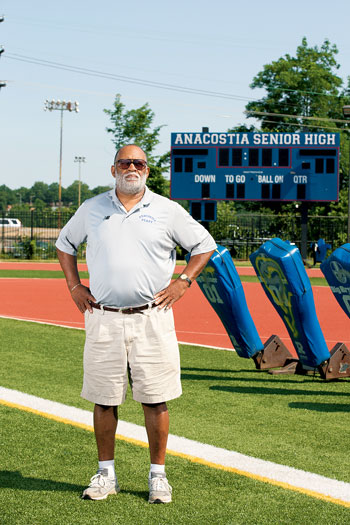
She was there for her son’s last breaths at Howard University
Hospital, and she was going to be the last person to lay eyes on him. Some
people got shot ten times and survived; her son had taken one bullet and
died. She told herself God had better plans for him.
She got angry when she heard someone say Devin was in the wrong
place at the wrong time. He was at school, she
thought.
Friends of Devin’s had told Marita what happened in the parking
lot that day. She knew that the young man who shot her son wasn’t aiming
for him and that he had turned himself in. She also knew that one of
Devin’s best friends was serving time at the Oak Hill Youth Center, where
Erik was being held. The facility, since closed, had a reputation for
violence.
That boy is not safe there, she thought. Someone is going to
kill him for what he did to Devin.
Marita called Reverend Anthony Motley, a family friend who
volunteered at Oak Hill, and asked him to get Erik into isolation. She
didn’t want Erik’s mother to go through what she’d been through. One dead
child was enough.
A t the Oak Hill Youth Center, Erik stood on his bed to talk to
other inmates through the vents. Being in isolation meant about 20 hours a
day in his room.
For a while, Erik believed that the bullet that hit Devin,
ricocheting inside his chest and tearing through his aorta, came from
someone else’s gun. He was sure the guys he’d fired at had shot back. He
thought he’d heard their gunshots.
“They were saying I killed somebody,” he says. “I didn’t want
to accept that.”
He had spent three months in a juvenile facility in Baltimore
when he was 13 after he and some friends filled a minivan with stolen dirt
bikes. But the place in Baltimore seemed like summer camp compared with
Oak Hill. Now 15, he was small for his age. The kids here knew what he was
accused of doing and taunted him during bus trips to court. When his
mother came to visit, she noticed bald spots on his head. His hair was
falling out.
He hadn’t been at Oak Hill long when Reverend Motley came to
see him. Motley, who had known Devin since he was seven, practiced
redemption ministry, which meant everybody got second and third chances.
He had suggested to Marita that she reconcile with Erik and his family, an
idea she didn’t resist.
An officer led Erik into a room where Reverend Motley was
waiting.
You’re just a kid, Motley thought. How could you do something
like this?
“Devin was like my grandson,” he told Erik. “Now I have to come
and face his killer. How do you think that makes me feel?”
Motley talked to Erik about accepting God into his life. Erik
didn’t say much—he listened—and Motley saw tears in his eyes.
T here was a point during Erik’s trial in March 2004, five
months after the shooting, when the gravity of what he was accused of hit
him. He was on trial for first-degree murder.
“His mother was on one side, my mother was on the other side,
but he was nowhere around,” Erik says. “I had to come outside of myself
and realize: Her son is no longer here.”
In court, where Erik was tried as a juvenile, his mother and
grandmother sat behind him every day. Michele would go to work in the
morning and leave early for the trial, hoping coworkers wouldn’t figure
out where she was going. She stopped answering her phone and hid from
television reporters.
“Just leave me alone,” she’d tell them. “Somebody’s child has
died.”
She exchanged looks with Devin’s mother in the courtroom, but
the two didn’t speak. Marita was angry, but not at Michele.
It’s not her fault, she’d think. She didn’t shoot my
son.
She was mad at whoever had handed Erik the gun, a person whose
identity she’d never know.
“Every child out here that gets killed with a gun—killed by
another child—some adult is responsible for that,” she says. “Whether they
sold it to him, gave it to him, or told him to hold it. Why would you give
a 14-year-old child a gun?”
Marita moved from her home because she couldn’t bear to see
Devin’s bedroom, where friends had left messages on the walls and ceiling.
She became an advisory neighborhood commissioner and helped reopen a
recreation center that had been closed for a decade.
“There’s nothing for kids to do,” she says. She’d relied on
places like that when she was a child. She saw violence in her Southwest
DC neighborhood—a friend was killed in an alley after playing cards at her
house in junior high—but she always had somewhere to go after
school.
“I was in the rec center till it closed at 8, then we was in
the house stimulating our minds,” she says. “Kids don’t do that no
more.”
Erik turned on his Discman and listened to Kanye West and Jay-Z
on the flight to Georgia in June 2004. It was his first time on an
airplane.
His fears were different than they’d been at Oak Hill, where he
had made straight A’s in classes. He was going somewhere unfamiliar, far
from his mother and grandmother, and he wouldn’t be going home for a very
long time.
A judge had convicted him of second-degree murder and committed
him to the Department of Youth Rehabilitation Services until age 21. At
sentencing, the judge told Erik that he needed to start taking
responsibility for firing at a car with two human beings inside, aiming to
kill them, and that it was time to accept that the bullet that hit Devin
came from his gun. Ballistics evidence had proven it.
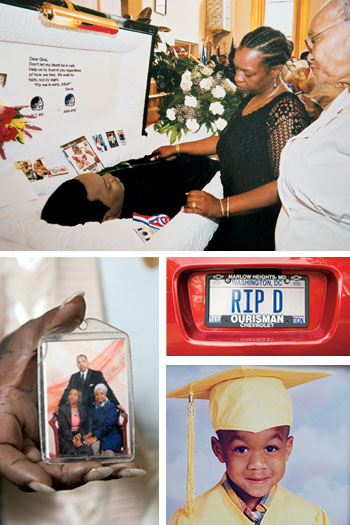
“It is particularly horrible and tragic that someone not
involved in the beefing, who was by all accounts an outstanding young man,
is now dead,” she said in court. “You have a good mind. You have the
support of your family. You are alive, in a city where all too many young
people are not. And maybe you will be able to put that together in some
positive way.”
The residential treatment center, a gated community outside
Atlanta, looked like a plantation to him. He was used to rowhouses in
Southeast; he’d never seen a house with pillars out front and a circular
driveway. The guys in his dorm looked at him as if they were trying to
figure him out. Other kids from DC were there, but he believes he was the
only one who had killed somebody.
For the first few weeks, Erik kept to himself. Classes were
easy for him—some of his peers couldn’t read—and teachers let him take
lessons back to his room. He liked art class and English. After school,
he’d play basketball or go swimming, then meet for Life Skills classes
about how to cook or how to manage his anger.
A counselor named Natacha started bringing books so Erik could
read about people who’d made mistakes and changed their lives. He rarely
talked about the shooting, and sometimes she would forget what he had
done. He asked her once why he had to grow up so soon.
In 2005, when Erik was 16, he moved to an independent-living
program in Georgia as part of his sentence. He went to a public high
school, where he played basketball and football and ran track. Friends
invited him over for dinner, and for the first time in his life he saw
mothers and fathers living in the same house. A friend’s mother altered
his suit for the senior prom. He studied for his learner’s permit and went
on dates. A counselor took him to poetry readings at Morehouse
College.
I want this kind of life, he thought.
Erik once heard a staff member at his program in Georgia say,
“The only thing you should be able to do is work. You’re a
murderer.”
Devin’s mother, Marita, has never thought of Erik that way. She
believes he’s a good kid who had something missing in his life and went
down the wrong path.
“He turned himself in,” she says. “A lot of people would have
kept running.”
Soon after Erik was sentenced, around Mother’s Day 2004,
Reverend Motley invited both Marita and Michele to a dinner event at
Greater Southeast Hospital called From Both Sides of the Tape. He wanted
mothers who had lost children to homicide to talk to the mothers of the
young men responsible. Both, he believes, are victims.
He invited two other moms, Pearl Boykin and Michelle
Richardson-Patterson. Boykin’s son, T.J., had shot and killed James
Richardson inside Ballou Senior High School three months after Devin’s
death. Erik’s mother, Michele, didn’t show up. She told Motley she wasn’t
ready.
A few weeks later, Marita saw Michele at one of Erik’s review
hearings. The judge checked in with Erik by phone every few months to see
if he was staying on track in Atlanta; Michele and Marita would sit in the
courtroom listening. After one of the hearings, both of them stood up and
walked toward the door. Then they stopped.
“I’m sorry,” Michele said.
“That’s all I really wanted to hear,” Marita told
her.
Motley sent the mothers on a weekend retreat to a farm in Anne
Arundel County, and they drove in the same car.
“I grabbed her hand and said, ‘I’m gonna hold your hand all the
way—it’s gonna be all right,’ ” says Marita. “I said, ‘You lost, too. You
lost the son you thought you had.’ ”
The two women started talking often and going out to dinner.
With Motley’s guidance, they helped form a group called Forgiving Mothers
Straight From the Heart and hosted teas at the Willard Hotel for women who
had lost children. They traveled to Atlanta to speak to a group of
churchgoers about forgiveness. Michele went to candlelight vigils in
Devin’s honor.
Marita and Erik recently met for the first time. Marita—who at
age 49 is battling Stage IV throat cancer—had always planned to meet him
in person. They’d spoken by phone more than once, and Erik had told her
how sorry he was.
“It was nice,” she says of meeting Erik. “We just had a regular
conversation. I could see the difference in him, the maturity. He’d
grown.” Erik says he didn’t feel prepared to meet her, but he went with
the hope that it might be a step toward closure. For both of
them.
Erik received his high-school diploma in Georgia and was sent
back to DC in 2007 to continue his sentence in a group home in Northwest.
When he returned, he had a reputation—a “tag,” he calls it. On the street,
being convicted of murder wasn’t such a bad thing. People wanted to be his
friend.
He got a job with a moving company but hated it. He’d get off
work, hang out in his old neighborhood, and take the Metro back to his
group home by curfew.
He’d been away from home for four years and felt proud of what
he’d accomplished—good grades, a diploma, friends. But the streets hadn’t
changed, and as an adult he was expected to fend for himself.
He stopped by his grandmother’s house one night for dinner and
told her he couldn’t stay long.
“Why are you rushing?” she asked.
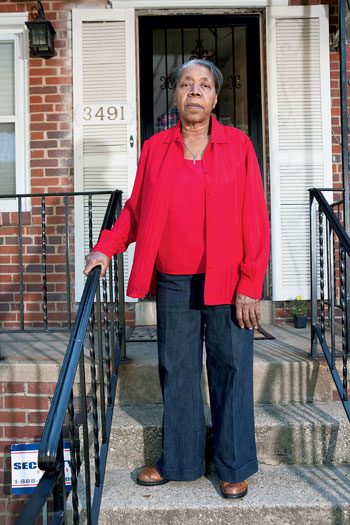
Later that evening, a neighbor knocked on her door to tell her
Erik had been arrested a few blocks away. Marva Green was furious. She had
asked Michele to move to Atlanta so Erik didn’t have to come back to
Anacostia, but her daughter had a stable job and didn’t want to
uproot.
You’ve been given a second chance, Green had told her grandson.
Don’t mess this up.
Erik pleaded guilty to possession of heroin with intent to
distribute and was sentenced to two years in prison.
He was angry at himself. “From that point on it was like,
‘Okay, enough mistakes,’ ” he says.
He read philosophy books and suspense novels in jail. He took
real-estate courses and studied Islam. He starting writing. He got to know
guys who’d been locked up 20 or 30 years, some of whom were never going
home.
I’m still young, he told himself.
He served 20 months, then in 2010 entered a job-training
program called Project Empowerment. He was assigned a contract job as a
legal assistant in the Office of Administrative Hearings in Judiciary
Square, a few blocks from the courtroom where he’d been convicted of
killing Devin. He wore a tie to work every day.
There was a moment last year when Erik found himself wondering
what Devin would be doing now if he were alive. A trip inside the court
building had him thinking.
“I’d never thought about all the time that’s gone by, all the
stuff Devin might have accomplished between then and now,” he
says.
He doesn’t allow himself to get stuck on thoughts like that. He
rarely even says Devin’s name. He prefers to focus on the message, on what
he’d say if he were standing in front of a group of kids living the life
he lived nine years ago.
“You have to think about the effect your actions can have, the
magnitude of what could happen,” he says. “You could take somebody’s life
and you could lose yours in the process. Are you willing to sacrifice all
of that over a situation that tomorrow you might not even care
about?”
Sometimes he wonders where he would be if the shooting hadn’t
happened. He recognizes the twisted reality: If he hadn’t fired his gun
after the homecoming pep rally and been sent away for treatment, he might
never have left Southeast.
“I don’t think I would have graduated high school,” he
says.
He might have been murdered. He might have shot somebody when
he was 18 instead of 15 and ended up serving life in prison. One of the
guys he was shooting at that day is dead, he says. Another drives a
Metrobus.
“There’s nothing I can do to change what happened,” he says. “A
mother lost her son, and lives were changed forever. I just try to live
through it and past it. If I can become a better person, then I’ll feel
like I accomplished something.”
Erik says he’s learned how to walk away from trouble. He can
visit his grandmother in Southeast and ignore the temptations of the
streets. Yet he’s still finding his way.
At 23, he’s living with his girlfriend in Oxon Hill, finishing
a novel he started writing in jail, and working part-time for a friend at
a used-car lot. Since prison, he’s dabbled in photography and club
promotions.
One of his goals is to own a chain of luxury hotels by age 45,
though he’s not sure how to make that happen. He enrolled in business
classes at Prince George’s Community College last fall but decided to take
a break because he couldn’t get motivated. “I’m scared of failure,” he
says.
Sometimes he thinks he wants to be a youth counselor, but he
worries about that kind of responsibility—worries about having kids look
up to him, the influence he could have on their lives.
He’s lost, in a way, though he wouldn’t say that. He says you
don’t “find” yourself; you create yourself, and that’s what he’s doing
now. He’s creating the person he wants to become, a person who would make
Devin’s mother proud. He hasn’t forgotten what she asked of him years ago.
Get out of jail and change your life around for me. That way my son
can live through you.
“I’m giving myself till my 25th birthday to find out what I
really want to do,” Erik says. “I just hope my good outweighs my
bad.”
This article appears in the July 2012 issue of The Washingtonian.

